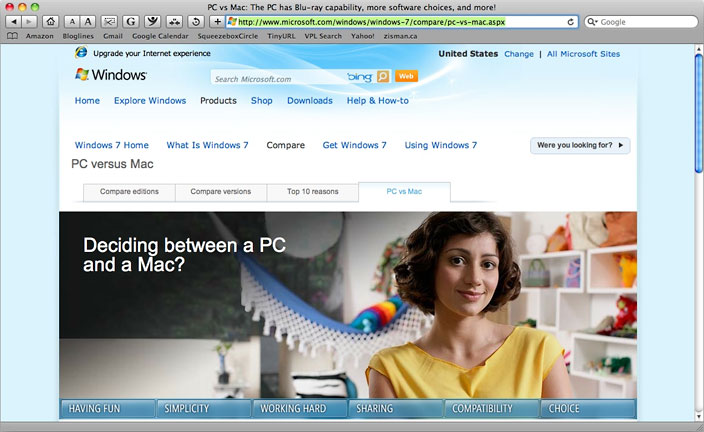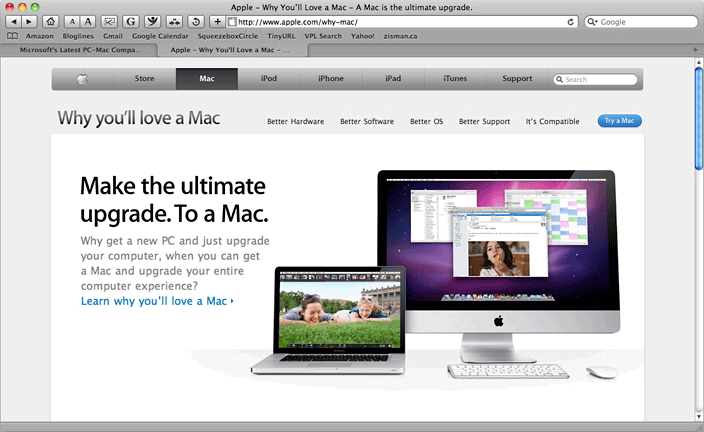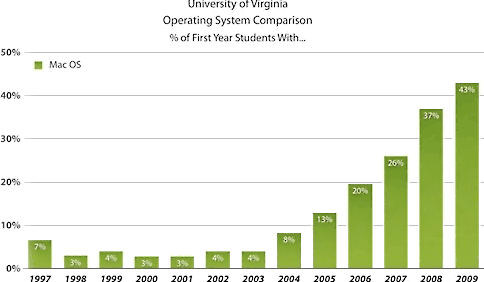Microsoft volleyed recently in the long-playing Mac vs. PC ping pong
match. The company added a new set of pages to its online Windows 7
website which has long had a section labelled Compare.
It's aimed at home users and uses nontechnical friendly-sounding
language. Up until now, the Compare section let viewers compare Windows
7 editions - Starter, Home Premium, Professional, etc. - and compare
Windows versions - XP, Vista, Win 7. When comparing Windows 7 to older
versions, it uses categories like "Makes everyday tasks simpler and
easier", "Works the way you want it to", and "Makes new and exciting
things possible".
Taking on Macs
New, though, is a tab labelled PC
vs. Mac. Click on it, and your browser's title bar displays:
"The PC has Blu-ray capability, more software choices, and more!"
Tabs display Microsoft's categories for comparison: Having Fun,
Simplicity, Working Hard, Sharing, Compatibility, and
Choice.

Microsoft's page comparing Macs and Windows PCs.
Let's see what Microsoft wants you to know. Note that while the site
(and the Twitter feed) are supposed to be about Windows 7, on this set
of pages, it's PC vs. Mac, as in Apple's now-abandoned set of TV ads
and Microsoft's "I'm a PC" response ads. According to Microsoft, "PCs
are designed for work and play, with features you need to get things
done on the job or at school and have fun at home or on the go".
Having Fun
- "Macs might spoil your fun. There are some things you simply can't
do out of the box with a Mac like watch, pause, rewind, and record TV
like a DVR."
- "You can't get a Mac that ships with a Blu-ray player..."
- "Most Macs can't hook up to your TV unless you buy a converter
dongle. Many PCs running Windows 7 are designed to connect directly to
TVs."
Simplicity
- "Macs can take time to learn."
- "Things just don't work the same on a Mac if you're used to a
PC"
- "Unlike Macs, many PCs running Windows 7 support Touch so you can
browse online newspapers, flick through photo albums . . .
using nothing but your fingers."
Working Hard
- "Macs don't work as well at work or at school."
- "If most of the computers in your office or school run Windows you
may find it harder to get things done with a Mac".
Sharing
- "Macs don't like to share."
- "It's easy with a PC."
Compatibility
- "Macs might not like your PC stuff."
- "...if you're a PC user, lots of your favorite stuff just might not
work on a Mac."
- "Apple's productivity suite file formats won't open in Microsoft
Office on PCs."
Choice
- "Macs don't let you choose."
- "You can get the PC you want, in the size and color you want, with
the features you want."
- "Macs only come in white or silver. PCs are available in a full
spectrum of colors...."
Reality Check
All these things are sort of true.
- You can buy a PC with a built-in TV tuner, even though most PCs
aren't equipped that way. To get a TV tuner on a Mac, you have to buy
an external gadget.
- Macs do work differently than Windows PCs - isn't that the whole
point?
- You can buy a red or blue PC from a variety of companies.
I'm not sure if Windows' inclusion of touch features (on selected
models, of course) is something to boast about, given the generally
poor acceptance these models have had in the marketplace - and
especially after the much better implementation of touch in Apple's
iPad.
Not surprisingly, much is left out, whether discussion of relative
security between the two platforms or even simple facts:
- "Apple's productivity suite" (i.e. iWork) can open and save in
Microsoft Office-compatible formats if desired - it just isn't the
default file format. (If you want Office file formats by default on
your Mac, just use Microsoft Office - or the free OpenOffice.org with
the default changed.)
- While there are certainly differences between Windows and Mac OS X
that require some getting used to, there are also big differences
between, say, Windows XP and Windows 7 that also require some getting
used to. (And isn't that the whole point in moving from XP to Win
7?)
Hopefully you don't have to be a Mac fanatic to notice the lapses in
logic in many of these comparisons: "most Macs" can't hook directly to
TVs vs. "many PCs" can. That could be restated - equally accurately -
as "some Macs and some PCs can hook directly to TVs."
In the interest of fairness, Apple also has a Mac/PC comparison on its website.
(After you take a peek at Microsoft's comparison page, wander over to
Apple's.)

Apple promotes Macs as "the ultimate upgrade" for PC users.
What's really going on here?
The whole tone of the site seems to be aimed at young folks - not
especially hip young folk, just regular kids who are going off to
college for the first time and perhaps looking to buy a notebook
computer to take along with them. There are lots of references to
"computers at work or at school".
Macs on Campus
This part of Microsoft's site appeared in August, as back to school
shopping season is heating up - and just as several news stories
appeared reporting huge growth in the number of Macs used by US
university and college students. See for instance, the chart on
Mac Usage Surges Amongst University of Virginia Freshmen Since 2004
(reproduced below) showing that from 2003 to 2009, Mac usage among
first year students at the University of Virginia surged from 4% to
43%.

At the University of Virginia, 47% of first year students used Macs
last year.
Similarly, Fortune published Big Macs
on Campus. While debunking reports that an astonishing 70% of
incoming freshmen would be coming to school with Macs, it reported on a
survey of last spring's college students that said that of laptop
owners, 27% had Macs - the most of any brand - and that among students
planning to buy a new laptop, 47% wanted to get a Mac.
When viewed against those statistics, Microsoft's PC vs. Mac website
makes more sense - the whole tone of the site seems carefully tailored
for a 17-18 year old, college-bound demographic.
What's Important to You?
And in the end, what are we left with? It's absolutely true that
Microsoft Windows is available on a range of PCs from multiple
manufacturers, in a variety of sizes and form factors and at a variety
of price points. Some are red, some are blue, some are black, some are
silver, and some are other colours. Some have Blu-ray built-in, some
have TV tuners, and some have 3G wireless.
Macs are only made by Apple, there are fewer
models, they have a smaller range of built-in options - and they
only come in silver or white.
If you really must have a computer in a color that's not silver or
white, or one that has built-in Blu-ray or a TV tuner, by all means,
buy a PC. If that's what's most important to you.
It's sad that Microsoft can't tell us anything we didn't already
know. 





